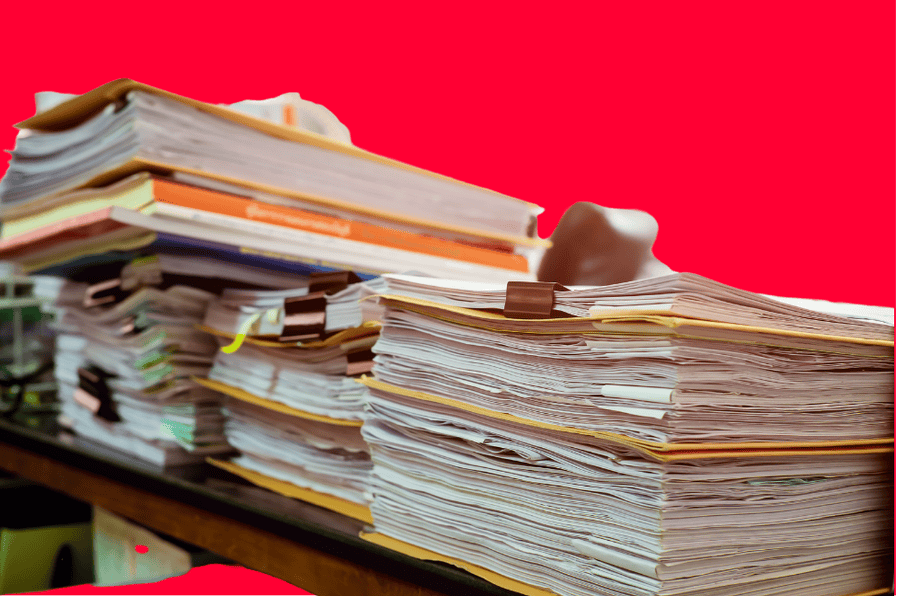
Are you holding onto documents just in case you might need them someday? It’s easy to let papers pile up when you’re unsure what’s essential and what’s not. Having too many papers can make it harder to find the important ones when you need them, and it can add to your stress. Luckily, with a few simple guidelines, you can organize your records and clear out some space.
From tax returns and bank statements to medical records and home repair receipts, each document serves a specific purpose. But how do you know when it’s safe to let go? In this guide, we’ll break down the recommended retention periods for key records and why securely disposing of them when the time comes is just as important.
Personal Record Retention Guidelines
Tax Returns
You’re not alone if you’re unsure how long to keep tax records. It’s recommended that you retain tax returns for a minimum of three years to cover the Internal Revenue Service (IRS) statute of limitations for audits. If you underreported income by more than 25%, keep them for six years.
Bank Statements
Keep bank statements for three months to reconcile transactions or address potential discrepancies. Retain longer if they’re relevant for taxes or financial documentation.
ATM Receipts
Hold onto ATM receipts for three months to compare with bank statements and ensure accuracy. Afterward, they can be discarded unless there’s an ongoing issue.
Credit Card Statements
Credit card statements should be kept for three to six years to track spending and verify charges. Retain longer if they include tax-related purchases or warranties.
Medical Insurance
Retain medical insurance documents for five years from the date of service to handle disputes or verify treatments. For longer-term care or chronic conditions, consider keeping them even longer.
Home Insurance
Home insurance policies should be kept for five years, unless you anticipate claims related to older incidents. In that case, keep them for up to ten years.
Pay Stubs
Keep pay stubs for three months to verify income when applying for loans or financial assistance. After this period, they can be discarded unless needed for tax purposes.
Investment Documents
Retain investment balance statements for at least three months to track performance and reconcile with annual summaries. Keep them longer if required for tax filing.
Home Repairs
Keep receipts and records for home repairs for up to ten years, especially for significant repairs. If a warranty is involved, retain them until the warranty period expires.
Utility Bills
Utility bills should be kept for three months for budgeting and record-keeping. If they relate to a home office or other tax deductions, keep them until tax filing.
Mortgage Documents
Keep mortgage documents for the duration of the loan to ensure proof of terms, payments, and balances. These documents are critical for financial and legal records.
Satisfaction of Mortgage Document
Hold onto the satisfaction of the mortgage document for as long as you own the home. This serves as proof that your mortgage has been paid in full.
Warranty Documents
Retain warranty documents as long as you own the product to ensure you can claim repairs or replacements if needed. Dispose of them once the warranty or product life ends.
Business Documents
Retention periods for business documents vary based on the type of document, the legal obligations, and industry standards. Consult a professional to determine any specific retention needs.
Why Is It Important to Maintain Records?
Retaining important documents is essential for legal, financial, and personal reasons. Documents like tax returns, bank statements, and insurance records serve as proof of transactions, income, and agreements. These can be crucial for audits, disputes, or major life events such as buying a home or applying for loans. Proper retention ensures you’ll have the necessary information on hand when needed, helping to avoid potential legal or financial issues.
However, once the necessary retention period is over, the threat of identity theft that comes largely from paper documents makes it equally important to dispose of documents safely. Sensitive data like Social Security numbers, account details, and medical records can lead to identity theft or fraud if improperly discarded. Expired documents can pose a threat to your financial health without providing any real value to you.
Secure methods like shredding help ensure your private information remains confidential and out of the wrong hands. Safe disposal is key to minimizing risk and maintaining your privacy. Best practices encourage you to go through your files at least once a year.
Get Free, No-hassle Quotes Today
Unless it’s something you have to keep, consider shredding everything that’s no longer needed. If you’ve got a higher volume of shredding, also consider using a shredding service. A personal shredding service like Ship ‘N’ Shred or the convenient alternative of mobile shredding are both more affordable than you think. Plus, they can save you a whole day’s time (and you won’t burn up your personal shredder trying to get through all your documents).
Shred Nations specializes in helping you find the right shredding service. To get started, fill out the form to the right, or give us a call at (800) 747-3365. Within minutes of receiving your request, you’ll receive quotes from local providers so you can select the company that fits your project best.









